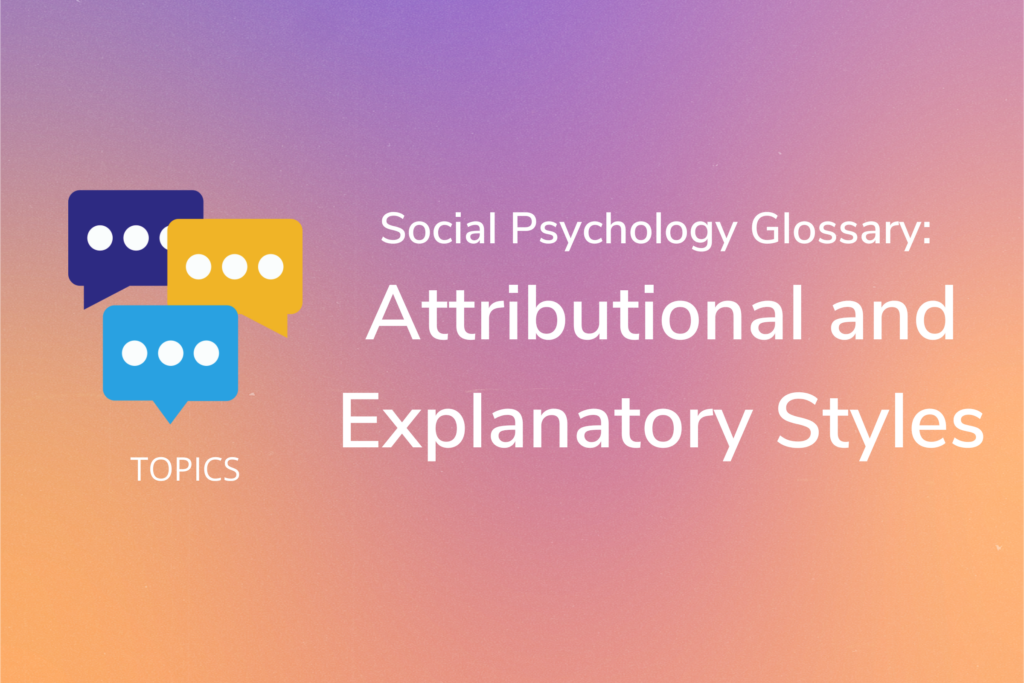Welcome to the Social Psychology Glossary!
In these posts, I will explain Social Psychology terms and theories and add some examples from research.
These terms and theories help social psychologists understand how people perceive others, interact with them, and make judgments about the social world and its members. These psychological processes can impact well-being and decision-making: being aware of their existence is a key factor that helps individuals and society to move towards gender diversity, gender equality, and equality in general.
Today we will explain what Attributional and Explanatory Styles are.
Let’s start!
Attributional and Explanatory Styles
In the last post of the Social Psychology Glossary, we explained what attributions are. We said that we might be unaware of the attributions we make and, in particular, of the types of attributions we make. But what types of attributions exist?
Psychologists usually distinguish attributions on three dimensions: attributions can be internal or external, stable or unstable, and global or specific.
This is quite a lot of information, so let’s focus a bit on each dimension and look at some examples.
First, attributions can be internal or external. These concepts have already been discussed in our last post, so I will just give the examples:
- Internal: Lucy is alone because she is an introvert. (The cause is found within the person)
- External: Lucy is alone because all her friends are at work. (The cause is found in the situation)
Second, attributions can be stable, if the cause is a non-transient factor, or unstable, if the cause is a transient factor, for example:
- Stable: Angela finished the book because she loves reading.
- Unstable: Angela finished the book because she was bored.
Finally, attributions can be global, if the cause is present in a variety of situations, or specific, if the cause is circumscribed, for example:
- Global: Matthew passed the exam because he studies hard.
- Specific: Matthew passed the exam because he likes this discipline.
The combinations of these attributional styles identify explanatory styles. The two explanatory styles that we find in literature are optimism and pessimism, and they can be identified by the types of attributions people use.
Optimistic perspectives will explain negative outcomes with causes that are external, unstable and specific, and positive outcomes with causes that are internal, stable, and global. On the contrary, pessimistic perspectives will explain positive outcomes with causes that are external, unstable and specific, and negative outcomes with causes that are internal, stable, and global.
A positive outcome, for example, is to win a sports competition. We speak with the winner, and we ask: why did you win? Someone might say that they won because the weather was good on that day (external, unstable, and specific). This would denote a pessimist explanatory style. Someone else, instead, might say that they won because of the constant training before the game (internal, stable, global). This explanation roots a more optimistic view on positive outcomes.
You may think of a negative outcome (i.e., losing a game) and try to come up with optimistic (external, unstable, and specific) and pessimistic (internal, stable, global) explanations for that event.
As you can imagine, explanatory styles have many relevant consequences on people’s well-being and performance. As PhD students, for example, we have to complete tasks and endure stressful situations. Previous research has shown that the optimistic explanatory style is a protective factor that helps withstand challenges, coping with health concerns, and that boosts academic performances. A pessimistic explanatory style, unfortunately, can influence the pessimists’ overall wellbeing, physical, mental health and overall achievements, and can be a risk factor.
But can hopefulness improve, or be learned? We will discuss this in our next post, with a psychological ability that is linked to endure and overcome negative events: Resilience.
Suggested Readings
Peterson, C. (1991). The meaning and measurement of explanatory style. Psychological Inquiry, 2(1), 1–10. https://doi.org/10.1207/ s15327965pli0201_1
Wise, D., & Rosqvist, J. (2006). Explanatory style and well-being. In J. C. Thomas, D. Segal, & M. Hersen (Eds.), Comprehensive handbook of personality and psychopathology, Vol. 1: Personality and everyday functioning (pp. 285–305). Hoboken, NJ: Wiley

Train the sponsor — Implementation of a new mentoring training (UK)
